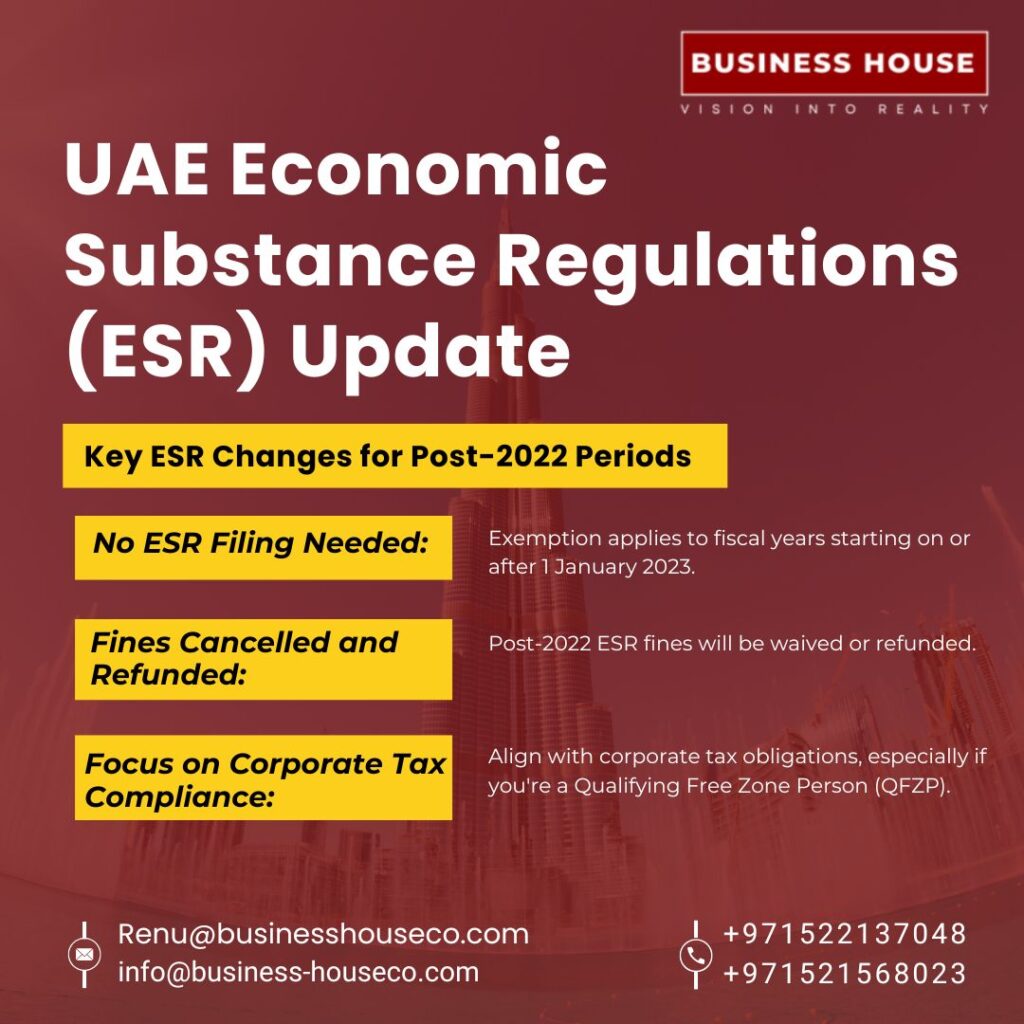
Substance Regulations (ESR): Key Changes for Businesses-The UAE Government has introduced a pivotal update to the Economic Substance Regulations (ESR) through Cabinet Decision No. 98 of 2024,The UAE Government has introduced a pivotal update to the Economic Substance Regulations (ESR) through Cabinet Decision No. 98 of 2024, issued on 2 October 2024. This decision significantly impacts the compliance obligations of businesses operating in the UAE. Below is a detailed explanation of the changes and their implications for businesses.
What Has Changed in the ESR?
- Limitation of ESR to Pre-2023 Fiscal Years
- The ESR now applies only to fiscal years ending on or before 31 December 2022.
- Businesses with accounting periods starting on or after 1 January 2023 are no longer required to file ESR notifications or reports.
- Cancellation of ESR Non-Compliance Fines
- All fines imposed for ESR non-compliance after 31 December 2022 will be cancelled.
- If fines for post-2022 periods have already been paid, businesses will be eligible for refunds.
- Shift of Focus to Corporate Tax Compliance
- Businesses, particularly Free Zone Persons (FZPs), must now demonstrate adequate economic substance through corporate tax filings submitted to the Federal Tax Authority (FTA).
Implications for Businesses
1. No ESR Filing Requirements for Post-2022 Fiscal Years
Entities operating with accounting periods starting after 1 January 2023 are exempt from:
- Filing ESR notifications.
- Submitting ESR reports.
2. Financial Relief Through Fine Cancellations
- Businesses affected by ESR penalties for non-compliance in post-2022 periods will receive refunds, providing significant financial relief.
3. Increased Attention on Corporate Tax Compliance
- Free Zone Persons (FZPs) and Qualifying Free Zone Persons (QFZPs) must ensure compliance with corporate tax requirements.
- Demonstrating adequate substance is now tied to the corporate tax system rather than the ESR framework.
Steps for a Seamless Transition and Compliance with Updated UAE Regulations
The recent changes to the UAE Economic Substance Regulations (ESR) signify a pivotal shift in regulatory focus. To help businesses adapt effectively, it is crucial to understand the steps required for compliance with the new framework. Below is a detailed explanation of the recommended actions:
1. Review Corporate Tax Compliance Obligations
Businesses, particularly Qualifying Free Zone Persons (QFZPs), must now focus on demonstrating economic substance through corporate tax compliance rather than ESR reports. This requires:
- Understanding the Requirements: Analyze the Federal Tax Authority’s (FTA) expectations for corporate tax filings, including the adequate substance test.
- Auditing Existing Processes: Review financial records, business operations, and activities to ensure alignment with corporate tax regulations.
- Identifying Potential Gaps: Detect and rectify any shortcomings in demonstrating substance, such as insufficient local operations or inadequate resource allocation.
Being proactive in this review will help avoid penalties and ensure a smooth transition to the corporate tax-focused system.
2. Consult with Tax Advisors for Compliance Alignment
Given the complexities of transitioning from ESR compliance to corporate tax obligations:
- Seek Professional Guidance: Engage experienced tax consultants familiar with UAE corporate tax laws and Federal Tax Authority processes.
- Develop a Compliance Strategy: Work with advisors to create a plan that ensures full compliance with corporate tax filing requirements, including documentation of business activities and economic substance.
- Leverage Expertise for Efficiency: Tax consultants can provide tailored advice to optimize tax positions, meet legal requirements, and minimize risk.
A strategic partnership with tax experts will ensure accurate filings and robust compliance measures.
3. Apply for Refunds for ESR Non-Compliance Fines
Businesses that paid fines for ESR non-compliance after 31 December 2022 can now claim refunds. To facilitate this process:
- Review Penalty Records: Confirm the amount and details of fines paid for post-2022 non-compliance.
- Submit Refund Applications: Work with the relevant authorities to file refund claims promptly, including providing all necessary documentation to support the claim.
- Monitor the Refund Process: Stay in regular contact with authorities to ensure timely processing and resolution of the refund request.
This step can provide financial relief and is an essential part of transitioning under the updated framework.
4. Adapt to the UAE’s Streamlined Regulatory Framework
The UAE’s decision to emphasize corporate tax compliance over separate ESR filings reflects its commitment to regulatory efficiency. Businesses must:
- Focus on the Bigger Picture: Align their operational and tax strategies with the broader corporate tax regime.
- Stay Updated: Monitor updates from the Federal Tax Authority and other regulatory bodies to remain compliant with evolving regulations.
- Invest in Compliance Systems: Implement robust internal systems to handle corporate tax obligations, ensuring timely and accurate reporting.
Final Thoughts
The UAE’s shift to a streamlined regulatory framework simplifies compliance for businesses while placing greater responsibility on corporate tax filings. By taking the outlined steps, businesses can adapt effectively, minimize risks, and thrive in the new regulatory landscape.
